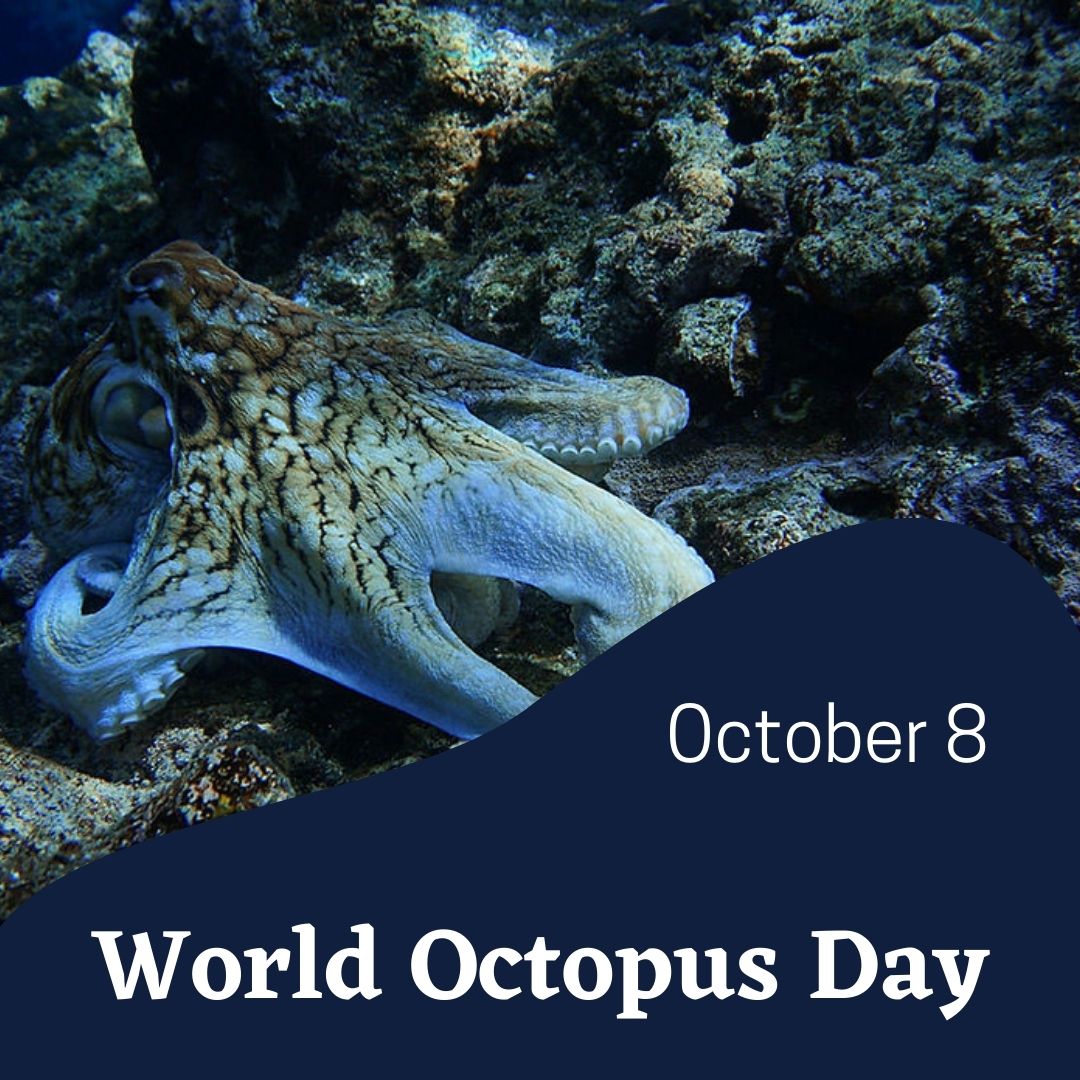October 8, 2025 World Day
Posted: Wed Oct 08, 2025 2:36 pm
About World Octopus Day

QUESTIONS: Have you ever seen an octopus up close — at an aquarium or in the ocean? Do you think octopuses are cute or creepy?
Have you ever eaten octopus — yes or no? (Be honest!)
Not heard of the World Octopus Day celebration before? Here’s everything you need to know in a series of quick-fire questions.
What is World Octopus Day?: World Octopus Day is a celebration of one of the most distinctive marine creatures on the planet — the octopus.
When is World Octopus Day?: World Octopus Day is celebrated on the 8th of October every year. It was first observed in 2014 but has been an annual event ever since.
Why do we celebrate World Octopus Day?: The World Octopus Day celebration draws attention to the beauty, intelligence, and sentience of these wonderful marine creatures. But it’s also a chance to highlight the threats octopuses face — including cruel octopus farming and marine pollution — along with octopus conservation initiatives.
7 facts about octopuses
1. Around 300 species of octopus and octopuses can be found in every ocean on Earth.
2. The biggest octopus in the world is the giant Pacific octopus, which can grow to 5.4 metres in length, with an arm span of almost 9 metres.
3. Octopuses can change the colour of their skin in a fraction of a second. They do this to camouflage and hide from predators, to trick their prey, and to communicate with one another.
4. Octopuses and squid are both cephalopods. But while octopuses have eight arms, squid have eight arms and two tentacles.
5. Factory-farmed octopuses are kept in unnatural, cramped confinement. They are sometimes killed by submersion in freezing water, which has been known to cause a cruel, slow, and painful death. Protecting octopuses from conditions like these is one of the missions, at World Animal Protection.
6. Octopuses don’t make good pets. They require huge tanks, exceptional water quality, and live prey — and because octopuses are so intelligent, they easily become bored and distressed in captivity.
7. Octopuses are highly intelligent and sentient. They can solve puzzles, use tools, learn from experience, and exhibit signs of stress and fear.
Threats to octopuses
While octopuses are not considered endangered, they face a number of threats in the wild.
Habitat loss and pollution
Octopuses are sensitive to water quality. Their reproduction and immune systems are impacted when pollution from industrial and agricultural activities enters their habitats.
Overfishing
Octopus are targeted by fishers across the world as a source of meat and for the aquarium trade. This has led to unsustainable fishing practices and the use of destructive fishing gear.
Octopus farming
In Gran Canaria in Spain, there are plans to launch the planet’s first high-density octopus farm. Here, around one million octopuses could be reared for food, with animal advocates around the world gravely concerned for octopus welfare.

QUESTIONS: Have you ever seen an octopus up close — at an aquarium or in the ocean? Do you think octopuses are cute or creepy?
Have you ever eaten octopus — yes or no? (Be honest!)
Not heard of the World Octopus Day celebration before? Here’s everything you need to know in a series of quick-fire questions.
What is World Octopus Day?: World Octopus Day is a celebration of one of the most distinctive marine creatures on the planet — the octopus.
When is World Octopus Day?: World Octopus Day is celebrated on the 8th of October every year. It was first observed in 2014 but has been an annual event ever since.
Why do we celebrate World Octopus Day?: The World Octopus Day celebration draws attention to the beauty, intelligence, and sentience of these wonderful marine creatures. But it’s also a chance to highlight the threats octopuses face — including cruel octopus farming and marine pollution — along with octopus conservation initiatives.
7 facts about octopuses
1. Around 300 species of octopus and octopuses can be found in every ocean on Earth.
2. The biggest octopus in the world is the giant Pacific octopus, which can grow to 5.4 metres in length, with an arm span of almost 9 metres.
3. Octopuses can change the colour of their skin in a fraction of a second. They do this to camouflage and hide from predators, to trick their prey, and to communicate with one another.
4. Octopuses and squid are both cephalopods. But while octopuses have eight arms, squid have eight arms and two tentacles.
5. Factory-farmed octopuses are kept in unnatural, cramped confinement. They are sometimes killed by submersion in freezing water, which has been known to cause a cruel, slow, and painful death. Protecting octopuses from conditions like these is one of the missions, at World Animal Protection.
6. Octopuses don’t make good pets. They require huge tanks, exceptional water quality, and live prey — and because octopuses are so intelligent, they easily become bored and distressed in captivity.
7. Octopuses are highly intelligent and sentient. They can solve puzzles, use tools, learn from experience, and exhibit signs of stress and fear.
Threats to octopuses
While octopuses are not considered endangered, they face a number of threats in the wild.
Habitat loss and pollution
Octopuses are sensitive to water quality. Their reproduction and immune systems are impacted when pollution from industrial and agricultural activities enters their habitats.
Overfishing
Octopus are targeted by fishers across the world as a source of meat and for the aquarium trade. This has led to unsustainable fishing practices and the use of destructive fishing gear.
Octopus farming
In Gran Canaria in Spain, there are plans to launch the planet’s first high-density octopus farm. Here, around one million octopuses could be reared for food, with animal advocates around the world gravely concerned for octopus welfare.